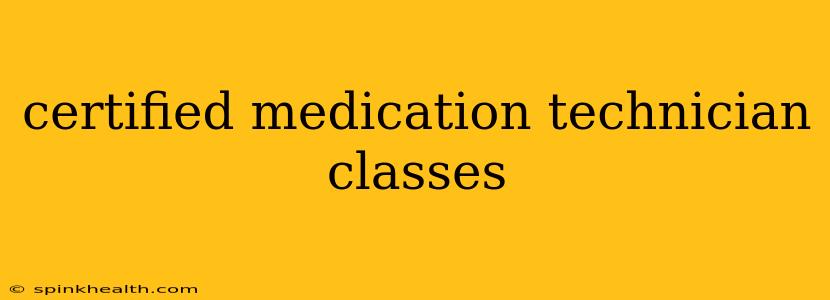The clatter of pill bottles, the quiet concentration of dispensing medication—this is the world of a Certified Medication Technician (CMT). It's a field demanding precision, accuracy, and a deep commitment to patient care. If you're drawn to the healthcare profession and possess a keen eye for detail, becoming a CMT could be the perfect career path for you. But where do you start? This guide will walk you through everything you need to know about finding and succeeding in certified medication technician classes.
What Does a Certified Medication Technician Do?
Before diving into the classes, let's understand the role itself. CMTs are vital members of healthcare teams, assisting licensed professionals in the safe and accurate handling of medications. Their responsibilities often include:
- Preparing medications: This involves accurately counting, measuring, and labeling medications for patients.
- Maintaining medication records: CMTs meticulously track medication inventory and patient administration records.
- Assisting with medication administration: Under the supervision of a licensed nurse or pharmacist, they may help patients take their medications.
- Ensuring medication safety: They play a crucial role in preventing medication errors through careful double-checking and adherence to strict protocols.
Where Can I Find Certified Medication Technician Classes?
The availability of CMT classes varies depending on your location. Some common avenues include:
- Community Colleges: Many community colleges offer certified medication technician programs, often as part of a larger healthcare curriculum. These programs typically provide a comprehensive education at a more affordable cost.
- Vocational Schools: Specialized vocational schools focusing on healthcare often include CMT programs in their offerings. They often prioritize hands-on training.
- Online Programs: While some aspects of CMT training require hands-on experience, online programs can provide a flexible and convenient way to learn the theoretical foundations. Always ensure any online program meets your state's requirements.
- Hospitals and Healthcare Facilities: Some larger healthcare systems offer in-house training programs for their CMTs. This is a great option if you have a preferred healthcare facility in mind.
What are the Requirements for Certified Medication Technician Classes?
Entry requirements vary, but generally include:
- High school diploma or GED: Most programs require a high school diploma or its equivalent.
- Background check: Due to the sensitive nature of the work, a thorough background check is usually mandatory.
- Drug screening: Many programs require candidates to pass a drug screening.
- CPR certification: Basic Life Support (BLS) or CPR certification is frequently a prerequisite.
How Long Does it Take to Become a Certified Medication Technician?
The length of CMT programs can range from a few weeks to several months, depending on the intensity and curriculum of the program you choose. Some programs offer accelerated options for those seeking quicker entry into the field.
What is the Cost of Certified Medication Technician Classes?
The cost of CMT classes varies depending on the institution and program length. It's essential to research various options to compare tuition fees, potential financial aid opportunities, and overall program costs.
What Certification is Needed to be a Medication Technician?
Certification requirements vary by state. While there isn't a single, universally recognized national certification, many states require or recommend specific certifications or licenses for medication technicians. It is crucial to research the specific licensing and certification requirements in your state before beginning any program. Contact your state's board of pharmacy or equivalent regulatory body for the most up-to-date information.
What are the Job Prospects for Certified Medication Technicians?
The demand for skilled healthcare professionals is consistently high, and CMTs are no exception. The aging population and increasing healthcare needs are fueling a growing demand for individuals qualified to handle medications safely and efficiently.
Are there different types of Medication Technician jobs?
While the core responsibilities are similar, CMTs can find themselves working in various healthcare settings, including:
- Hospitals: CMTs in hospitals work alongside nurses and pharmacists, supporting medication management for inpatients.
- Nursing homes: These settings require CMTs skilled in administering medications to residents with diverse needs.
- Pharmacies: Some pharmacies employ CMTs to assist with medication dispensing and inventory management.
- Clinics: CMTs in clinics play a critical role in ensuring patients receive their medications accurately and efficiently.
Embarking on a career as a Certified Medication Technician is a rewarding journey that blends meticulous attention to detail with a deep sense of purpose. With the right training and dedication, you can make a significant impact on the lives of patients while establishing a successful career in the dynamic world of healthcare. Remember to always thoroughly research programs and state regulations to find the best fit for your goals and aspirations.

